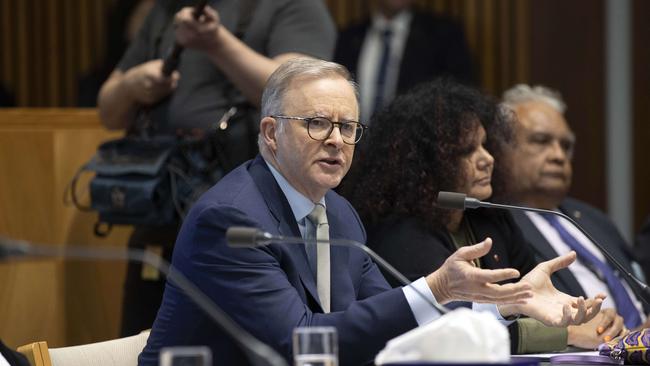NACC ‘could tap phone of PM’
The national anti-corruption commission could also allow for key government departments to be searched without the need for a search warrant.

Anthony Albanese and senior cabinet ministers could be subject to phone taps and surveillance by a proposed national anti-corruption body if such actions are deemed necessary by its chief commissioner.
Legislation introduced into parliament to create the national anti-corruption commission also allows for key government departments, including Defence and Treasury, to be searched by the NACC without the need for a search warrant.
The Attorney-General, Mark Dreyfus, would be granted special power to limit the ability of the NACC to conduct searches of commonwealth agencies, but only if he believed such a search “might prejudice the security or defence of the commonwealth”.
Under the NACC’s proposed telecommunications interception and surveillance devices powers, no one, including the Prime Minister, would be exempt.
The NACC bill contains only limited exceptions from the commission’s jurisdiction – for example, for members of the judiciary – to reflect the constitutional separation of powers.
While the commission has broad powers to search commonwealth agencies without a warrant, parliamentary offices and MPs’ electorate offices or homes cannot be searched without a warrant.
The NACC would also require a warrant to search premises occupied by the ABC and SBS under the NACC.
Warrants would be required to search other media outlets, The Australian understands, with safeguards around revealing sources.
While “prohibited and restricted Defence areas” are exempt from the NACC’s remit, this does not include the Department of Defence or the Department of Foreign Affairs and Trade.
Similar powers of searching without warrants and intercepting telecommunications are available to state anti-corruption commissions, with the NSW ICAC last year tapping the phone of former premier Gladys Berejiklian and MP Daryl Maguire.
Former NSW Supreme Court judge and Centre for Public Integrity chairman Anthony Whealy said it was appropriate the NACC be allowed to exercise the powers given to root out corruption “no matter the rank” of those it was investigating.
“If (the commission) is investigating something the prime minister or ministers have done, they should certainly use those tactics,” he said. “The threshold … is serious or systemic corruption. If they’re investigating very serious wrongdoing, they have the right to use all their powers.”
Australian Lawyers Alliance criminal justice spokesman Greg Barns said there was nothing in the bill to prevent the commission from surveilling a prime minister or members of cabinet if necessary, but he said it was possible information gleaned from tapped phones would not be used on national security grounds. “They could claim some sort of privilege, whether cabinet in confidence or national security.”
Mr Barns said the power for the attorney-general to exempt a premises from being searched without a warrant through the stroke of a pen was “extraordinary … What’s to stop a government saying that immigration detention, for example, where there are complaints about corruption, being exempt.
“I find that an extraordinary power. It requires only for the attorney-general to say it ‘might’ prejudice security or defence. Not ‘will’, not ‘shall’ and not with ‘reasonable belief’. Just ‘might’.”
Mr Dreyfus on Thursday confirmed he wanted the commission to be “up and running” by the middle of next year and signalled he would be “prepared to look at any ideas brought forward” when it came to the threshold of holding public hearings.
Independent MPs continued to call for a lower threshold for the NACC to conduct public hearings. In its current form, the bill says the commission can hold public hearings only in “exceptional circumstances” and if it is in the public interest.
Independent senator David Pocock had “real concerns around having such a high bar for public hearings” when asked how he would vote on the bill, hoped to pass by the end of the year.
Asked whether he would change this language, given the opposition to it from the crossbench and the Greens, Mr Dreyfus told the ABC: “We are prepared to look at any ideas people bring forward to improve this bill.”
Mr Albanese said he believed the government had got the balance right in ensuring accountability for those engaged in corruption, while ensuring those involved in an inquiry weren’t unjustly “smeared”.
“We’ll have (parliamentary) hearings; if there are sensible suggestions put forward, then we of course are open to that … But I’m very confident we’ve got the model right,” he said.
Peter Dutton, who on Wednesday confirmed the Coalition’s provisional support for the bill, warned against bending to calls for the “exceptional circumstances” threshold to be removed. “I want a body that has teeth, but I don’t pursue the Greens and the teals attack on it because what they want is instability,” the Opposition Leader told 2GB on Thursday.








To join the conversation, please log in. Don't have an account? Register
Join the conversation, you are commenting as Logout